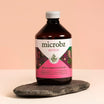Every day we eat breakfast in the morning and by lunch time that food has been organised by our bodies into what it needs now to function, stored energy to be utilised later and waste.
What a miraculous process!
Most people do not think about it very much but this process is the foundation of our health. Our digestion is something which we usually only think about if it is not functioning well.
We take it for granted until it struggles.
But this process is fundamental to our wellbeing. Even if you consider yourself to have good digestion, there is always more that you can do to support it. Here are my five top tips to support good digestion.
1. Relax and prepare
Good digestion starts before you even put food into your mouth. How often are you in a rush and you grab something without much thought (even if it is healthy)?
Or how often do you eat while you're doing something else, like watching TV, or when you're on the go?
When you think about eating something, or you smell food, your digestive juices start flowing and getting ready. This works really well when we are relaxed and take time to prepare our food with consideration, but if we are stressed and rushed the process gets stunted.
So take a more considered moment before you eat something, and make time to breathe and focus on what you're going to eat. Then when you're eating stay relaxed for the duration and chew well. This will really help to stimulate the digestive juices.
My mother always said 'never eat when you're upset' and this is really good advice because it halts the digestive process. In the mornings aim to have your first meal when you can focus, relax and enjoy it. It's also good for children to build in the habit of having a relaxed breakfast.
In the evenings know that the moment you're cooking is part of your body getting ready to receive a meal. Atmosphere, smells and conversation are all nourishing in themselves; think Italian!
Most cultures put more importance on the atmosphere of meal times than we do in the UK.
2. Eat Right for You
Listen to what your body wants and needs. Try to let go of the should's and should not's that are in your mind and tune into what your body is trying to tell you. Try not to tailor your diet to what is fashionable or to what has worked for someone else. Your body's preference can change seasonally and daily; flexibility is a good thing. Try and work with your body and not against it, and try to listen to it.
3. Water
Water is really important; it is good practice to filter your tap water and bathing water well which does not need to be expensive.
Remember that your physical body is mostly microbes and water. We don't want to give the good microbes a hard time with chlorine and chemicals!
Hydrating well is also important for abundant digestive juices and good motility throughout the whole gut. You have a whole ecosystem inside you and around you which needs tending to in order for it to take care of you.
You can do that by eating simple fresh foods and not using chemicals or eating junk food.
4. Microbes!
What buddies they are!
They teach us it's all about balance and that we are also a part of nature. Focus on restoring balance to improve your digestion. The most fascinating thing about our microbiome is that each one is unique. Did you know that a mother will produce milk which is unique for her child in its components and microbial design?
The biome in our gut is created unique to us in our first years. It then goes on to manage a whole host of functions within our bodies not least, digestion, absorption and creation of nutrients.
So let's eat for them by having lots of vegetables! Cellulose and inulin can be found in, for example, leeks, asparagus, artichokes and bananas. Polyphenols from fruits, berries, broccoli and herbs. Beta glucans from mushrooms, seaweeds and oatmeal.
Galactooligosaccharides from chickpeas, beans, and broccoli, and resistant starches like that in peas and cold potatoes.
The body also needs long chain Omega 3 fatty acids which can be found in fatty fish, algae, grass fed dairy, meat and eggs.
Microbes don't like stress, chemicals and EMF frequencies, all of which we are surrounded by these days and wreak havoc on our microbiome.
So a daily dose of probiotics like microbz sustain, kidz probiotics or women's probiotics, helps top up the gut with tools to support a healthy environment and therefore optimum digestion.
Your body then uses what it needs to create its own niche habitat. Stay away from probiotics that only contain a few strains of microbes.
5. Movement
We are not designed to be still. It is very common for work life to be sedentary. The gut likes movement. It's not that it needs to be a work out in the gym, that's fine if you enjoy it, but just a simple walk in nature is brilliant for digestion.
Gardening, housework, stretching out after sitting, (like cats and dogs do), doing things manually, and dancing; we could all probably do with a lot more dancing in our lives!
Written by our nutritionist, Zara. Find out more or ask her a question about your nutrition on our website here.







